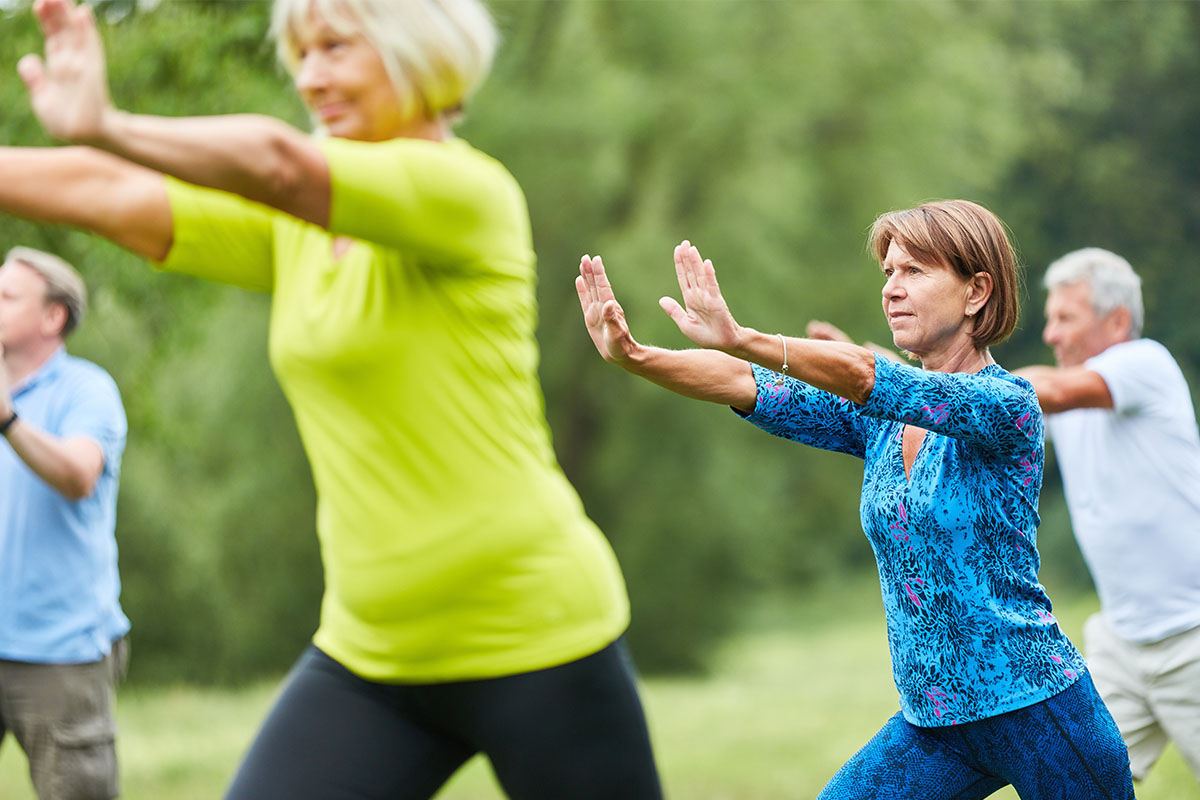Tai Chi for Parkinson’s: Meditation and Balance in Motion

Tai chi is an ancient Chinese martial art that blends gentle, flowing movements with mindful breathing to create a powerful mind-body practice. For people with Parkinson’s, it offers both physical and mental benefits—helping improve balance, reduce fall risk, and enhance overall well-being.
Tai chi styles are named after the family lineages that developed them, each with unique characteristics (MoraMarco, 2000):
- Chen – Combines fast, forceful moves with softer, slower ones.
- Yang – Graceful, flowing, and relatively easy to learn. The most widely practiced style.
- Wu – Soft, compact, and relaxed movements.
- Hao – Small, precise movements with a strong focus on internal power.
- Sun – Modern style incorporating stepping drills, waist and leg work, and meditative qigong principles.
Forms of Tai Chi
- Long Form – May be over 100 postures and movements.
- Short Form – May vary from 15-60 postures; easier to learn for beginners.
- Bafa Wubu Tai Chi – A simplified form introduced in 2018, shown to reduce anxiety and depression in college students (Lyu et al., 2018; Zhang et al., 2023).
Benefits of Tai Chi
Research and clinical practice suggest tai chi can:
- Reduce the risk of falls.
- Improve balance, coordination, and mobility.
- Enhance concentration and relaxation.
- Foster social connections when practiced in groups.
- Provide a no-equipment, low-cost exercise option.
- Be done indoors or outdoors—at home, in parks, or at fitness or community centers.
- Adapt to different fitness levels.
- Offer nature connection, fresh air, and safe sun exposure when practiced outside.
For example:
- Balance training → fewer falls
- Mindful breathing → reduced anxiety
- Gentle movements → less stiffness and improved mobility
¿Qué dicen los estudios?
Multiple studies highlight tai chi’s value for people with Parkinson’s:
- Cognitive preservation – Long-term aerobic exercise and tai chi may help maintain cognitive function (Tsai et al., 2025).
- Motor and neurocognitive benefits – Tai chi and aerobic exercise both improve motor symptoms and brain health (Chang et al., 2023).
- Non-motor improvements – Benefits include better sleep and cognition (Li et al., 2024).
- Fall prevention – Effective for improving balance and reducing falls (Liu et al., 2019; Li et al., 2012).
- Styles of Tai Chi – Tai chi/qigong can help with depression and overall well-being (Song et al., 2017).
Getting Started
- Choose a flat, open area for practice.
- Wear loose, comfortable clothing.
- Keep water handy to stay hydrated.
- Learn from a qualified instructor—preferably in person at first, though virtual live or recorded options are also available.
Class Selection Tips
How to choose the right program:
- Look for instructors experienced with Parkinson’s.
- Ask about small class sizes for more personal attention.
- Consider programs that integrate mindfulness and meditation for relaxation benefits.
Safety Precautions for Parkinson’s
Before starting tai chi, especially for those with balance issues, safety is essential:
- Get medical clearance from a healthcare provider before engaging in an exercise program.
- Practice near a stable surface or wall for support.
- Start with short sessions to avoid fatigue.
- Use chairs, if needed.
Recursos útiles
- Local fitness centers, studios, medical centers, and colleges often offer classes.
Reflexiones finales
If you’ve never tried tai chi, consider joining a class. You may discover a practice that nurtures your body, calms your mind, and connects you to a supportive community.
Referencias
- Chang CL, Lin TK, Pan CY, et al. Distinct effects of long-term Tai Chi Chuan and aerobic exercise interventions on motor and neurocognitive performance in early-stage Parkinson's disease: a randomized controlled trial. Eur J Phys Rehabil Med. 2024;60(4):621-633.
https://pubmed.ncbi.nlm.nih.gov/38888734/
- Fisher KJ, Li F, Shirai M. Ezy Tai Chi: A simpler practice for seniors. Journal on Active Aging. May/June, 18-26.
https://www.foundationforpn.org/wp-content/uploads/2024/10/ezy_tai-chi.pdf
- Li F, Harmer P, Fitzgerald K, et al. Tai chi and postural stability in patients with Parkinson's disease. N Engl J Med. 2012;366(6):511-519.
https://pubmed.ncbi.nlm.nih.gov/22316445/
- Li G, Huang P, Cui S, et al. Tai Chi improves non-motor symptoms of Parkinson's disease: One-year randomized controlled study with the investigation of mechanisms. Parkinsonism Relat Disord. 2024;120:105978.
https://pubmed.ncbi.nlm.nih.gov/38244460/
- Liu HH, Yeh NC, Wu YF, Yang YR, Wang RY, Cheng FY. Effects of Tai Chi Exercise on Reducing Falls and Improving Balance Performance in Parkinson's Disease: A Meta-Analysis. Parkinsons Dis. 2019;2019:9626934.
https://pubmed.ncbi.nlm.nih.gov/30918623/
- Lyu S, Zhang J, Nie J, et al. Comparative study of physiologic characteristics between the newly compiled Bafa Wubu of tai chi and 24 form simplified tai chi. BMC Sports Sci Med Rehabil. 2020;12:43.
https://pubmed.ncbi.nlm.nih.gov/32760589/
- MoraMarco J, Benzel R. The Way of Walking: Eastern Strategies for Vitality, Longevity and Peace of Mind. Chicago, IL: Contemporary Books, 2000.
- Song R, Grabowska W, Park M, et al. The impact of tai chi and qigong mind-body exercises on motor and non-motor function and quality of life in Parkinson’s disease: a systematic review and meta-analysis. Parkinsonism Relat Disord. 2017;41:3–13.
https://pubmed.ncbi.nlm.nih.gov/28602515/
- Tsai CL, Chien CY, Pan CY, Tseng YT, Wang TC, Lin TK. Effects of long-term Tai Chi vs. aerobic exercise on antioxidant activity and cognitive function in individuals with Parkinson's disease. Behav Brain Res. 2025;476:115274.
https://pubmed.ncbi.nlm.nih.gov/39332640/
- Zhang J, Gao T, Li Y, et al. The effect of Bafa Wubu of Tai Chi on college students' anxiety and depression: A randomized, controlled pilot study. Front Physiol. 2023;14:1036010
https://pubmed.ncbi.nlm.nih.gov/36760533/
Written by Ziya “Z” Altug, PT, DPT, MS, DipACLM, OCS
Done hoy,
cambiará vidas para siempre
PCLA funciona gracias a las generosas contribuciones de personas como usted.
Por favor, considere la posibilidad de donar hoy para que podamos seguir proporcionando apoyo crítico a los afectados por el Parkinson.

